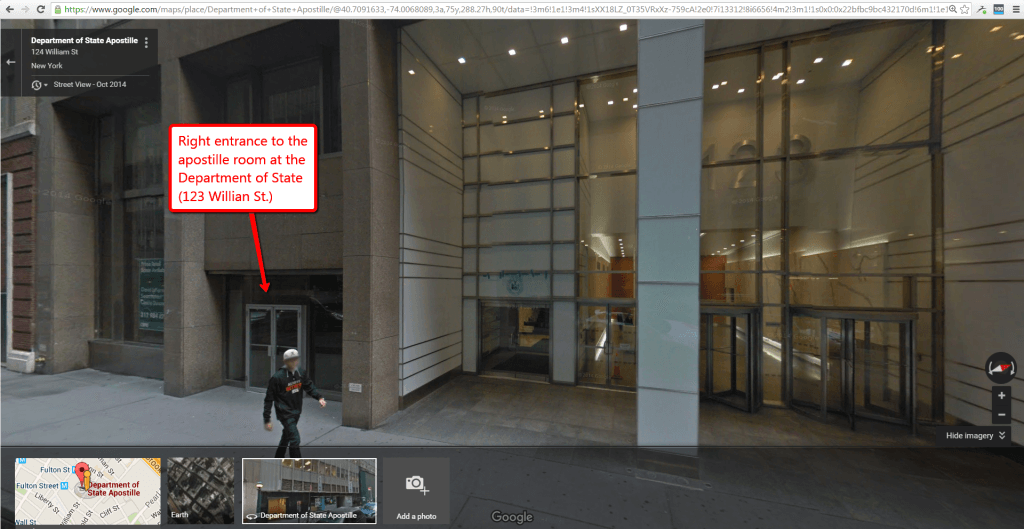The Ultimate Guide on How to Get an Apostille Done in New York City
An Apostille certification is required to make certain documents legal and applicable in foreign countries. The Hague Convention of 1961 abolished the requirement for legalization of foreign public documents and standardized the process. The Apostille treaty outlines the specific methods through which a legal document issued in one signing country can be certified for legality in all other signing countries. Business translation often requires an Apostille before the translated document will take effect in the desired country.
New York State Department of State Apostille Services’ Covid Notice
At this time, New York State Department of State Apostille services may be obtained by mail, or by appointment for in-person service within their Albany or New York City locations.
In-person services are by prior appointment-only, and walk-in services will not be provided without an appointment. However, customers are allowed to drop off Apostille requests. Drop off requests will not be treated as a priority and will be processed according to receipt date. If you have questions, please contact us at: 518-474-4429.
How an apostille looks like:
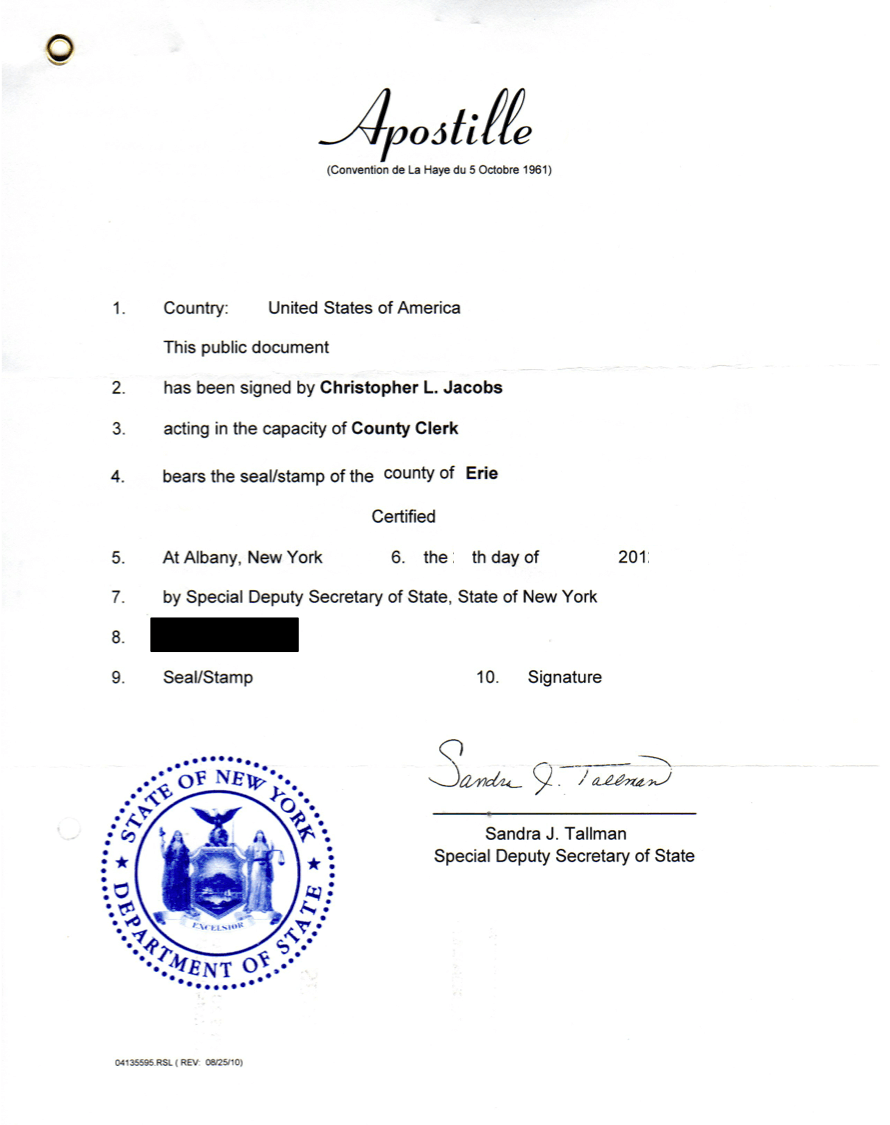
(click on the picture to enlarge)
What is the purpose of an apostille?
The Apostille Certificate attached to a document translation does not certify the translation, but rather the authorization by the signatory and the accuracy of the seal used on the document certifies it. An Apostille provides no information regarding the quality of the translation. If you want to ensure that your documents are translated to the highest standard, only use native translators and linguists for your translation.
Getting an Apostille
Obtaining an Apostille for your translated document (or any other document) is a fairly simple process but can take a considerable amount of time. In this guide, we go over each step you need to follow to obtain your apostilled document.
What Documents Need an Apostille?
The types of documents that may need an Apostille are court documents, administrative documents, notarial acts, personal documents, and certain official certificates. Birth certificates, death certificates, divorce decrees, and patent applications are just a few documents that may need an Apostille to go into effect in a foreign country.
Note that you can have both the original document and the corresponding translation apostilled. Make sure to check with the receiving party if they need both documents apostilled or just one of them.
What if the Country is not a Signatory of the Apostille Treaty?
If you have a document or translation that needs to be legally valid in a country that does not recognize an Apostille (e.g., Canada, China, and the UAE), then you will need to handle a process similar to the one described here directly at that country’s consulate. The consulate will be able to walk you through the necessary steps to obtain a certification recognized in the target country. The Apostille convention was designed to streamline the process of getting documents recognized internationally and many countries now use the Apostille.
Apostille in New York City
New York City has one of the highest demands for translation apostille. The city’s large number of corporate headquarters and diverse nationalities warrant a steady need for apostille services. These are the exact steps you need to follow to get an apostille done in New York:
1. Notary Public
For a document to be accepted for apostille, it usually must be signed by a notary public. It doesn’t really matter what type of notarization the notary does. A simple “sworn before me” on anything you present to the notary will usually suffice. Important! If you are in Manhattan, make sure the notary is approved in the “New York County.” How do you know that? Easy, just ask the notary upfront!
Why you should make sure it is a “New York County” approved notary public.
Getting a document notarized by someone approved in “Kings County,” for instance, will require you to visit the “County Clerk” of Kings County to validate the signature of the notary public. ‘Kings county’ is the right county responsible for notaries approved in Brooklyn. Many notaries will take their examinations in Brooklyn while working in Manhattan, so it is quite easy to encounter this type of situation. Again, make sure you get your documents notarized by a “notary public approved only in New York County” if you live in Manhattan.
2. County Clerk Certificate
After getting your document notarized, the next step will be getting the “County Clerk Certificate.” To obtain this certificate, go to the “New York County Clerk.”
The address for the building is 60 Centre St., New York, NY 10007. Don’t worry when you see “New York State Supreme Court” in the front of the building. That’s exactly where the county clerk you are looking for is located. Now, one trick that will save you a lot of time. Do not enter the building through the front entrance. The security procedures in place may cause long lines of people to wait for their turn. Now, imagine that scene on a rainy day. Yes, we have been there already;-(
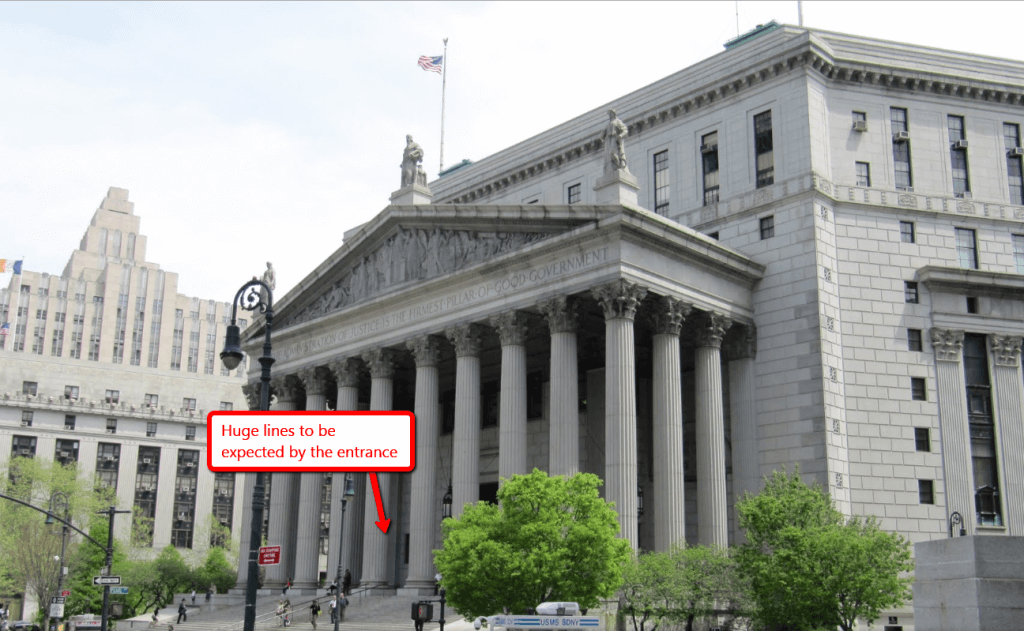
(click on the picture to enlarge)
The secret is: go to the back of the building.
There, you can simply dash through a second checkpoint with no waiting time at all. Don’t ask why the court won’t tell people about this second entry. A simple banner telling people about the second door would save hundreds if not thousands of hours wasted in line at this court. But, we never saw such a banner by the main entrance. So, make sure you pick the right entrance to the building.
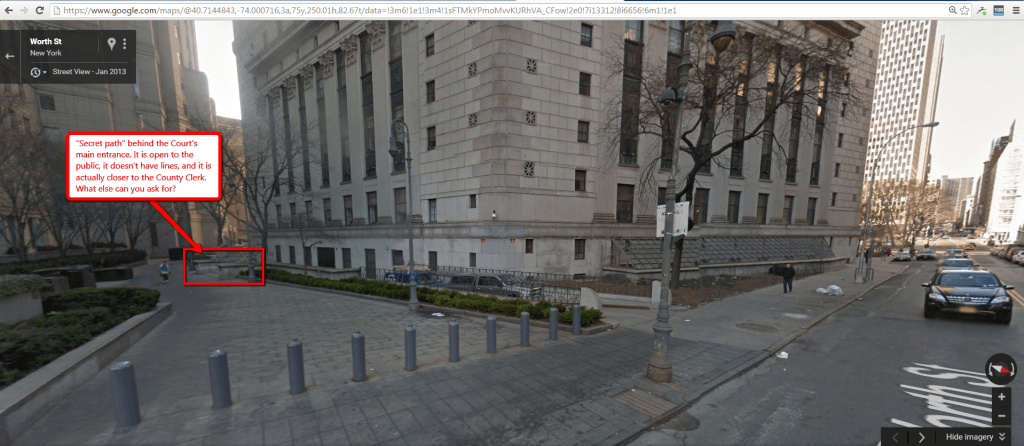
(click on the picture to enlarge)
Once inside the building, take the elevator or stairs to the basement. Once there, go to “Room 161” and take the left line.
Notary at the County Clerk? Two secrets in one!
The first half of the secret: you might get your document notarized for free at the county clerk!! Ops, why have we told you to bring your document already notarized, then?
Alright, here is the second half of the secret. Notaries in the County Clerk are a pain in the neck. They will decline your documents for several reasons, one being the existence of content in any language other than English. One may ask if this isn’t a fair reason. Well, we don’t think so. A document with some content in a foreign language that has a plain text in English to which the subscriber “sworns to be true” should be enough for them to notarize.
Remember that they are not notarizing everything on the document, only a specific act related to this document. In the case of translation services, the manager of the translation company or the translator in charge of the translation will “sworn before the notary public that the translation being presented is a faithful version of the original document”. The notary public is not liable for the quality of the translation, or even if there is a translation there or not. They are just saying “alright, this person came to me and said such a thing to be true.”
So, now you know you should never go to the County Clerk for a free notarization. Reducing their workload is probably one of the reasons why they are so quick to decline notarizing documents.
Considering you already have your notarized document, once you reach the end of the left line, they will get your document, ask for your name and give you instructions for payment. Payment is usually done at a cashier to the right of the line you just took. It takes time for the left line to move, but once you have received instructions for payment, things should move fast. The cashier is quick to get your money and give you the certified documents. The cost for the County Clerk Certificate per document in October 0f 2022 is less than $ 5.00. They will accept payments in cash.
How a County Clerk Certification looks like
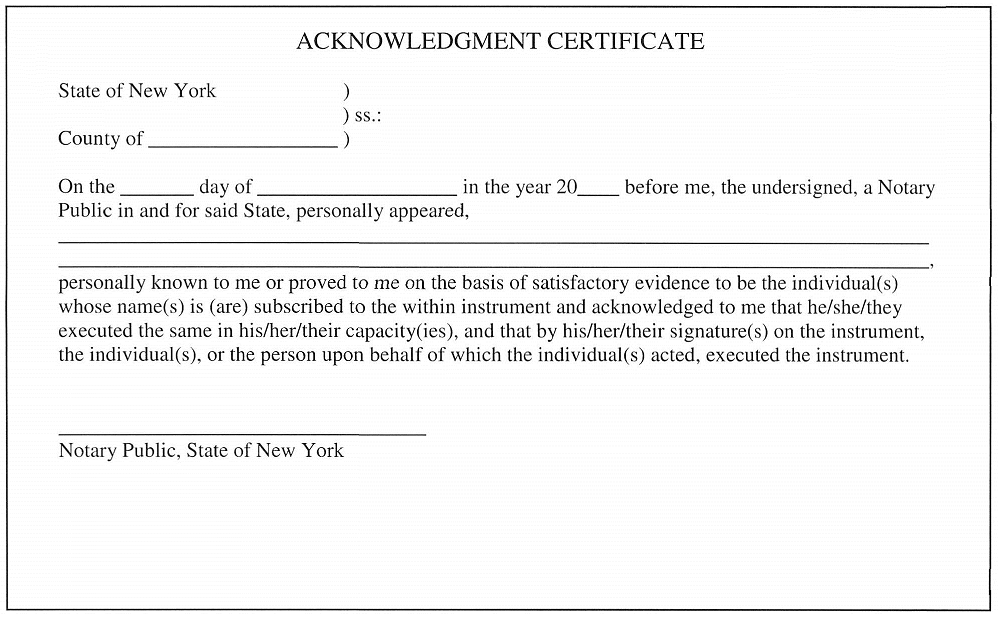
(click on the picture to enlarge)
3. Finally, the Department of State
You will have to go to a specific section of the Department of State of New York in New York City. It is ‘so specific’ that you will actually take a separate entrance to reach an area dedicated to licensing examinations administered by the NYS and the apostilles.
This entrance is located to the left side of the address you are looking for: 123 William St., New York, NY 10038.
Once you are in, take the elevator upstairs. You will see a banner like this, “Apostille Services to the right.” DON’T FOLLOW THE BANNER. Instead, look for a form called “Apostille Request Form”, which will be close to the banner. Make sure to fill out the form according to the number of documents and country where the apostille(s) will be used. Only after that, you should follow the banner.
The banner will direct you to another room, where you will find chairs and a single line in the middle of the room. Take the line making sure you have in your hands:
- the documents with the County Clerk certifications attached
- your ID
- the money order(s)
- the completed form.
The lady at the window will check the documents and tell you to wait (as long as you have few documents. Once the documents are ready, they will call you by your name (if you are handling the apostille for yourself) or the name of the company (if you are getting an apostille on behalf of a business).
No Cash Accepted
First things first. The Department of State won’t accept payments in cash. Therefore, make sure you have a money order for $ 10.00 for *each* of the documents being apostilled. You can combine the amounts in a single money order to save the fees. For example, four documents could be paid with a single $ 40.00 money order instead of four money orders of $ 10.00 each. If you are buying a western union money order with a $ 2.00 fee, using a single money order would save you $ 6.00 in our example.
Waiting time: they will handle the apostilled document on the same day if you have few documents being notarized. The same day could mean between 15 to 60 minutes. For large batches (e.g., 10 documents), they may ask you to return on another day.
Got the apostille? MISSION ACCOMPLISHED. Following these quick tips can save up to $ 300.00 in fees for an apostille. The required time for all the steps described in this guide could go from 1.5 to 3 hours.
Support our content creation by using our legal translation and business translation services.

